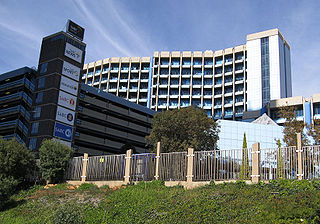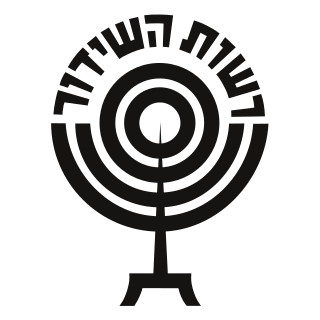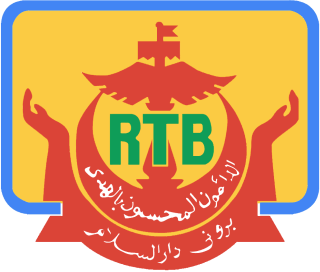A television network or television broadcaster is a telecommunications network for distribution of television program content, where a central operation provides programming to many television stations or pay television providers. Until the mid-1980s, television programming in most countries of the world was dominated by a small number of terrestrial networks. Many early television networks evolved from earlier radio networks.
Telecommunications in the Gambia includes radio, television, fixed and mobile telephones, and the Internet.
Public broadcasting involves AM and FM radio, shortwave radio, and television distribution by media outlets whose primary mission is public service. Public broadcasters receive funding from diverse sources including license fees, individual contributions, public financing and commercial financing. Many outlets stream their audio and video programs on the Internet, or produce content specifically for the web.
The Senegambia is, in the narrow sense, a historical name for a geographical region in West Africa, which lies between the Senegal River in the north and the Gambia River in the south. However, there are also text sources which state that Senegambia is understood in a broader sense and equated with the term the Western region. This refers to the coastal areas between Senegal and Sierra Leone, where the inland border in the east was not further defined.

The South African Broadcasting Corporation (SABC) is the public broadcaster in South Africa, and provides 19 radio stations (AM/FM) as well as six television broadcasts to the general public. It is one of the largest of South Africa's state-owned enterprises.
Ríkisútvarpið (RÚV) is Iceland's national public-service broadcasting organization.

ARD is a joint organisation of Germany's regional public-service broadcasters. It was founded in 1950 in West Germany to represent the common interests of the new, decentralised, post-war broadcasting services – in particular the introduction of a joint television network.

Hrvatska radiotelevizija, or Croatian Radiotelevision, is Croatia's public broadcasting company. It operates several radio and television channels, over a domestic transmitter network as well as satellite. HRT is divided into three joint companies – Croatian Radio, Croatian Television and Music Production, which includes three orchestras and a choir.

The Israel Broadcasting Authority was Israel's public broadcaster from 1948 to 2017.

The Islamic Republic of Iran Broadcasting formerly called National Iranian Radio and Television until the Iranian revolution of 1979, is an Iranian state-controlled media corporation that holds a monopoly of domestic radio and television services in Iran. It is also among the largest media organizations in Asia and the Pacific region and a regular member of the Asia-Pacific Broadcasting Union. Its head is appointed directly by the Supreme Leader, Ayatollah Ali Khamenei.
Religious broadcasting, sometimes referred to as faith-based broadcasts, is the dissemination of television and/or radio content that intentionally has religious ideas, religious experience, or religious practice as its core focus. In some countries, religious broadcasting developed primarily within the context of public service provision, whilst in others, it has been driven more by religious organisations themselves. Across Europe and in the US and Canada, religious broadcasting began in the earliest days of radio, usually with the transmission of religious worship, preaching or "talks". Over time, formats evolved to include a broad range of styles and approaches, including radio and television drama, documentary, and chat show formats, as well as more traditional devotional content. Today, many religious organizations record sermons and lectures, and have moved into distributing content on their own web-based IP channels.


Radio Television Brunei is the national public broadcaster of Brunei. Radio Brunei made its first broadcast on 2 May 1957, with a television service starting on 1 March 1975. Radio Television Brunei monopolises the free-to-air television in the country, and also radio until 1999, when the country's only commercial radio station, Kristal FM was founded. Currently, it operates 3 television channels and 5 radio stations. The network's logo was based from the national emblem of Brunei.
Radiodiffusion Télévision Sénégalaise (RTS) is the Senegalese public broadcasting company.

Algeria has more than 45 independent Arabic language and French language publications as well as 4 government-owned newspapers, but the government controls most printing presses and advertising. The Algerian newspapers with the largest circulations are Echourouk (1,800,000), Ennahar (1,600,000), El Khabar (1,000,000) and Quotidien d'Oran (700,000); all four are employee-owned. In 2004 and 2005, the government increased the access of Berber language and culture to both print and broadcast media.
The Gambian hip hop scene is a relatively new scene in African hip hop which developed in the mid-1990s and was heavily influenced by American hip hop and Senegalese hip hop. Gambian hip-hop has been heavily influenced by international music scene including worldbeat, Senegalese wolof music, and American hip hop, as well as traditional Gambian mbalax and n'daga music. Dominican merengue and Jamaican reggae, ragga, and dancehall have also influenced the development of Gambian hip-hop.
The British Broadcasting Corporation (BBC) is a British public service broadcaster. Headquartered in London, it is the world's oldest national broadcaster, and the largest broadcaster in the world by number of employees, employing over 21,000 staff in total, of whom approximately 17,900 are in public-sector broadcasting.
Radio Gambia is the national radio broadcaster of the West African state of the Gambia. Established in 1962, it became the first radio station in the Gambia.
Television was first introduced to Iran in 1958, as a privately-owned and commercially-operated enterprise, before being nationalised, remaining a state-controlled monopoly, first of National Iranian Radio and Television, and following the Iranian Revolution in 1979, of Islamic Republic of Iran Broadcasting.







